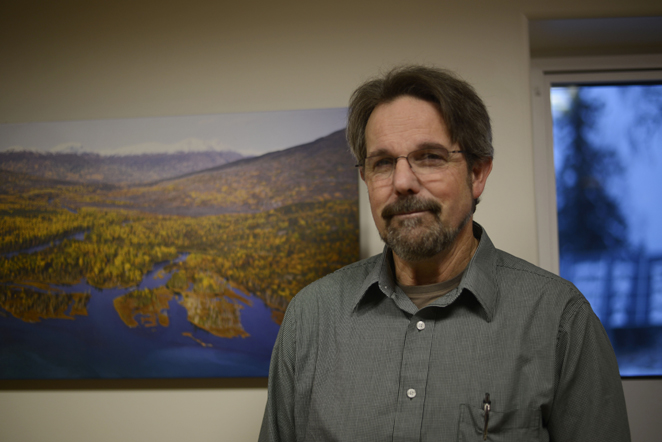As the new head of the Kenai Watershed Forum, there is a lot to learn, but Jack Sinclair said he’s up to the task.
Sinclair has taken over the role of executive director for the Soldotna-based conservation nonprofit after former executive director Robert Ruffner announced he would step down earlier this year. He said he has been working part-time in the role for about a month but transitioned into a full-time position on Dec. 18.
Stepping in for Ruffner, who has been executive director of the organization since its inception in 1997, will be a tough act to follow, Sinclair said.
“It’s a bit like taking the world off Atlas’ shoulders,” Sinclair said. “It’ll be a bit daunting at first, to come behind everything (Ruffner) has done.”
Sinclair was formerly the Division of Parks & Outdoor Recreation supervisor for the Kenai Peninsula from 2005-2012 and a ranger before that in the Prince William Sound area. During that time, he had the opportunity to work with the Kenai Watershed Forum on some of the hydrocarbon studies on the Kenai River and on the powerboat motor regulations, he said.
“Working with the Watershed Forum caught my eye for all the work they were trying to do, to make the right decisions about water usage, water quality, habitat,” Sinclair said. “It seemed like a good transition for me. As soon as I retired from state parks, it seemed like if anything was open over here, I’d be interested in it.”
Moving forward, the Kenai Watershed Forum will be seeing some new faces. Longtime StreamWatch coordinator Lisa Beranek has taken another job in the Lower 48, leaving the position vacant, among others.
As the positions are filled and new members are brought up to speed, it will shape the organization’s programs, Sinclair said.
Some things will stay the same, though.
The organization’s key programs — including StreamWatch, the Kenai River Festival, the summer camp and Adopt-a-Stream programs — will remain, as will bank and river restoration, ongoing wetlands mapping, hydrography and water quality research.
But until everything settles, they won’t expand, Sinclair said.
“Many of the things I’ll be doing will be keeping things going the way they’ve been going,” Sinclair said. “We’ve had some very successful programs. There isn’t necessarily anything new.”
Specifically, the forum will continue with ongoing projects on fish passage barriers and road design to improve how fish can move through the streams as well as controlling invasive plants such as reed canary grass and elodea, Sinclair said. Those are long-term projects that require continuing work to control, he said.
Although it will be a change to switch from a job with the state to one with a nonprofit, the two share many things — including the resources and conservation concerns, he said. Even though the Kenai Watershed Forum technically has no control over the land it studies, the researchers want to provide as much information as they can to aid in the management and regulation of the waters in the community, he said.
“We try to, in the best way possible, make people understand the effects of what we’re doing and how we can maybe change those things in the future and make better choices in the future about those,” Sinclair said. “Whether it’s the LNG project or fisheries decisions, we try to take each of those issues and give our best input but not take a political stance on it.”
Sinclair said his experience with the state parks gave him a chance to understand how communities use the resources around them, from hunting to fisheries to waterways. Although he’s no longer in management, he said the understanding would inform his role in leading the Kenai Watershed Forum.
“We oversee a lot of studies and research and stewardship over those waters that go over all these public lands,” Sinclair said. “That’s where we have common boundaries. I’ve learned a lot from each of them.”
Elizabeth Earl is a reporter for the Peninsula Clarion.



